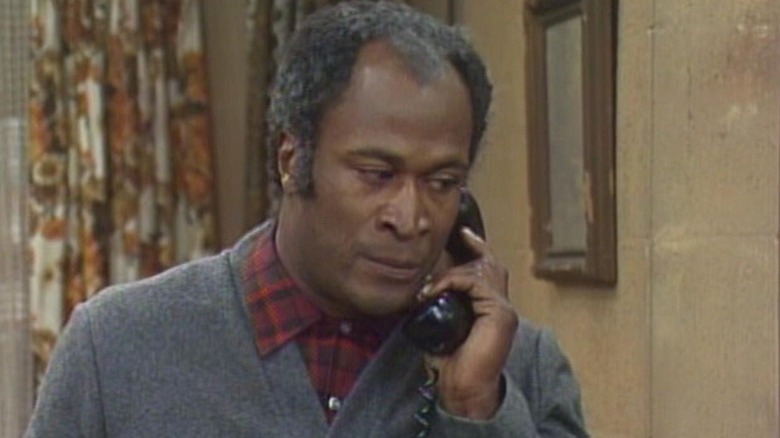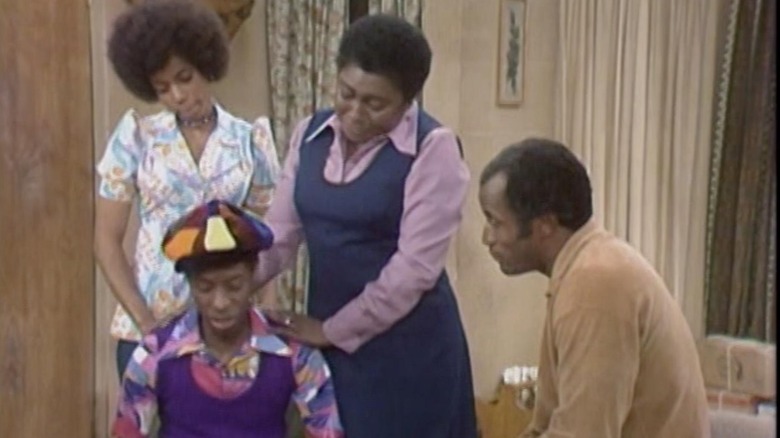Here's The Real Reason The Legendary John Amos Was Fired From Good Times
John Amos was not a man to be trifled with.
The celebrated actor, who passed away on August 21, 2024 at the age of 84, came to the performing arts from the gridiron. He was signed as a free agent by the Denver Broncos in 1964, and caught on with the Kansas City Chiefs in 1967. But, in between those very brief stints, he mostly played semi-pro ball. I do not mean this as a slight. They go hard at that level because they're looking to impress pro scouts. So Mr. Amos took his share of punishment before he started applying makeup to step in front of a camera and portray one of the 1970s most beloved TV dads.
If you watched "Good Times" during its six-season run from 1974 to 1979, or caught it in syndication, you know Amos' James Evans, a hard-working man grinding to raise three children along with his saint of a wife Florida (Esther Rolle), departed the show after season 3. This led to a dramatic episode featuring a grief-stricken Florida smashing a salad bowl, balling up her fists and wailing "Damn, damn, DAMN!" It's an unforgettable moment, one that carried with it a degree of uncertainty. Why did Amos, a dashing fellow who could shift gears and be a ladykiller if needed, abruptly leave a series that had made him something of a star?
Amos made no secret of his distaste for the white "Good Times" writers' sometimes hackneyed, sometimes off-key depiction of an African-American family. He was particularly distressed by their showcasing of the series breakout star, Jimmy Walker, whose dopey J.J. Evans exclaimed "Dyn-o-mite!" at least once per episode.
Ultimately, this distaste curdled into contempt.
The writers got tired of having their lives threatened over jokes
In a 2014 interview with the Archive of American Television, Amos opened up about leaving "Good Times" at the height of the series' popularity. He believed the writers were missing the mark with their portrayal of the younger children, Michael (Ralph Carter) and Thelma (Bern Nadette Stanis), both of whom had aspirations to be, respectively, a Supreme Court Justice and a surgeon.
As Amos told the Academy:
"The differences I had with the producers of the show, I felt that there was too much emphasis being put on J.J. and his chicken hat saying 'Dyn-o-mite!' every third page, when just as much emphasis and mileage could have been gotten out of my other two children and the concomitant jokes and humor that could have come out of that."
Amos ultimately felt like the writers weren't taking his concerns seriously, or valuing the fact that he was a Black man who had life experiences that they lacked. Finally, the actor, who was still in his thirties at the time, lost his cool.
"I left because I was told that my services were no longer needed because I had become a 'disruptive element.' In other words, I didn't have the diplomacy that I think I've cultivated over the last 10 or 15 years. Being born in Newark, raised in East Orange, I had a way of voicing my differences against the script that weren't acceptable to the creative staff. I mean, the writers got tired of having their lives threatened over jokes."
Esther Rolle shared Amos' frustrations and quit the show after its fourth season (though she did return for the final season). As for Amos, he became a highly sought-after character actor. He was wonderful in movies as disparate as "The Beastmaster," "Lock Up" and "Die Hard 2," but that dad image fit him so well. Outside of "Good Times," he'll always be fast-food restaurateur Cleo McDowell from "Coming to America." What a warm, unique presence he brought to everything. Mr. Amos, you will be missed.

